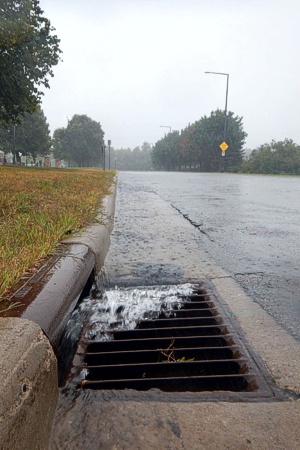

The Municipal Separate Storm Sewer System (MS4) program was developed in response to the adoption of the Federal Clean Water Act and is administered through the Environmental Protection Agency (EPA). In Pennsylvania, the state Department of Environmental Protection (PA DEP) manages municipalities with MS4 permits and those with waivers. These agencies oversee overall MS4 compliance through the National Pollutant Discharge Elimination System (NPDES) permitting program. Palmer Township successfully renewed its’ MS4 permit in 2023 which is valid for the next five (5) years.
The MS4 permit is a federal and state mandated permit that requires municipalities to adhere to Minimum Control Measures (MCMs) centered around education, participation, tracking, and reporting. There are six (6) MCMs that detail various steps and goals that municipalities must meet and implement with their communities. MCM requirements include:
MCM 1: Public Education and Outreach on Stormwater Impacts.
Palmer Township must create a stormwater education program to distribute educational materials and conduct outreach activities related to the impacts of stormwater discharges and how the public can aid in the process of pollutant reduction. Required Best Management Practices (BMPs) include developing and maintaining an education program, developing, and maintaining a target audience group list for education in the Township, publish educational articles in Township newsletters, local newspapers, and Township websites, and flyers and other display boards at community events to educate residents on stormwater impacts.
MCM 2: Public Involvement and Participation
This MCM focuses on ways to engage the public and target audiences from MCM 1 and creating a program to involve residents and various stakeholders in the Township in stormwater management, soliciting input from residents on proposed plans including the Pollutant Reduction Plan (PRP), and asking for public input on illicit discharge discoveries.
MCM 3: Illicit Discharge Detection and Elimination
Illicit discharges are any stormwater flows that do not consist entirely of stormwater. This could include fluids from vehicle leaks, purposeful dumping of oil or other chemicals, and fertilizers from residential lawns. Palmer Township must develop, implement, and enforce an illicit discharge detection program by identifying high priority areas, hot spot use areas, and maintaining records of any illicit discharges. Palmer must also create and maintain maps of outfalls and perform inspections or screenings to ensure there are no instances of dumping or pollution. Some new regulations under this MCM include an updated model ordinance that municipalities must enact to comply with the permit and program regulations. Palmer recently amended the stormwater management ordinance in 2023 (Ord. No. 2023-482).
MCM 4: Construction Site Stormwater Runoff Control
Palmer Township currently has a Memorandum of Understanding (MOU) with the Northampton County Conservation District (NCCD) to assist with monitoring and enforcement of active construction projects. This MOU ensures that Palmer Township can meet these MCM requirements by relying on the partnership with the NCCD and sharing stormwater information when violations occur and by including the NCCD in proposed construction plans. Required BMPs include NCCD and PA DEP notifications of earth disturbance activity greater than an acre, tracking Notice of Violations (NOVs) issued by the NCCD, and enacting and enforcing an ordinance that requires erosion and sediment control on construction sites.
MCM 5: Post-Construction Stormwater Management (PCSM)
PCSM measures are focused on stormwater management controls once construction projects are completed. This includes implementing and enforcing an ordinance to require stormwater management for new development and redevelopment projects. BMPs also include encouraging Low Impact Development (LID) practices, adequate operation and maintenance (O&M) of all stormwater facilities, and tracking, maintaining and inspecting all PCSM facilities including private PCSM BMPs.
MCM 6: Pollution Prevention and Good Housekeeping
The last MCM details steps and practices for municipalities to follow for pollution prevention. Some of the BMPs include implementing an O&M procedure that includes municipal employee training, inventorying municipal operations, creating a written O&M plan to follow that includes ways to reduce pollutants on streets, proper waste disposal, and reviewing policies in place for any updates that need to occur.
Other permit requirements include developing and implementing a PRP that focuses on water quality and how to update regulations to reduce pollution entering local waterbodies. PRP requirements are based on the impairments of the streams that each MS4 discharges to, and could include measures based on reducing metals, pathogens, or organic compounds. For more information on the MS4 program and program requirements, please visit our resources tab.